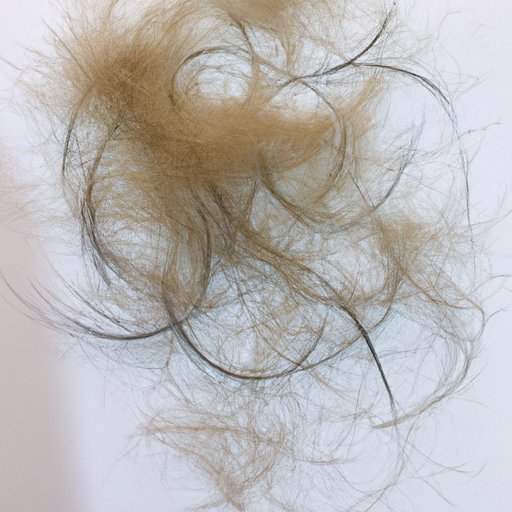Introduction
Hair shedding is a normal part of the hair growth cycle. However, excessive hair shedding can be a cause of concern. If you are shedding more hair than usual, it can be distressing to deal with. In this article, we explore why you might be shedding so much hair and provide tips and treatments to reduce it.
Exploring the Causes of Excessive Hair Shedding
Excessive hair shedding can have various causes and can be divided into three main categories: stress and hormones, nutritional deficiencies and genetics. Let’s look at each in turn.
Stress and Hormones
Stress is a major factor when it comes to excessive hair shedding. Stress can trigger a hormone called cortisol, which can increase the amount of hair shedding. High levels of cortisol can also lead to changes in other hormones, such as androgens and estrogen, which can also affect hair loss.
Nutritional Deficiencies
Nutritional deficiencies can also contribute to excessive hair shedding. Iron, protein and vitamin B12 are essential nutrients for healthy hair growth. A lack of these nutrients can lead to an increase in hair shedding. Other vitamins and minerals, such as zinc and biotin, can also play a role in hair health.
Genetics
Genetics can also be a factor in excessive hair shedding. Some people may be predisposed to hair loss due to their genetic makeup. This type of hair loss is known as androgenetic alopecia and is most commonly seen in men. It is caused by a sensitivity to the male hormone dihydrotestosterone.
Other Potential Causes
Other potential causes of excessive hair shedding include certain medications, medical conditions, age, and certain hair care products. It is important to speak to your doctor if you are concerned about any of these potential causes.
A Guide to Understanding Why Hair Shedding Occurs
To understand why you might be shedding too much hair, it is important to know how hair grows. The hair growth cycle has three phases – the anagen phase (growth phase), the catagen phase (transition phase) and the telogen phase (resting phase). During the telogen phase, hairs will naturally shed from the scalp. It is normal to lose up to 100 hairs per day during this stage.
There are different types of hair loss, including temporary and permanent. Temporary hair loss is often caused by stress or changes in hormones and can resolve itself once the underlying cause is addressed. Permanent hair loss is usually caused by genetics or medical conditions and cannot be reversed.

Tips to Reduce Hair Shedding
If you are experiencing excessive hair shedding, there are some steps you can take to reduce it. These include eating a healthy diet, getting adequate exercise, managing stress, avoiding certain hair care products, and using natural remedies.
Healthy Diet
Eating a healthy, balanced diet is essential for healthy hair growth. Make sure you are getting enough iron, protein, and vitamins B12 and D. You should also include foods that are rich in zinc, omega-3 fatty acids, and biotin, as these nutrients are important for healthy hair.
Adequate Exercise
Getting regular exercise can help reduce stress and improve circulation, both of which can help reduce hair shedding. Exercise also helps to promote healthy hormone levels, which can help reduce hair shedding.
Stress Management
Stress can have a major impact on hair shedding. Taking steps to manage stress, such as yoga, meditation, and counseling, can help reduce hair shedding. Additionally, making lifestyle changes, such as cutting down on caffeine and alcohol consumption, can help reduce stress.
Avoiding Certain Hair Care Products
Certain hair care products, such as shampoos and conditioners, can contain harsh chemicals that can irritate the scalp and lead to excessive hair shedding. It is important to choose hair care products that are specifically designed for your hair type and avoid those that contain sulfates, parabens, and other potentially harmful ingredients.
Common Pharmaceutical Treatments for Excessive Hair Loss
If you are experiencing excessive hair shedding, there are some pharmaceutical treatments available. These include finasteride, minoxidil, and corticosteroids. Finasteride is a drug that blocks the action of the male hormone dihydrotestosterone, which can help reduce hair loss. Minoxidil is a topical solution that can help stimulate hair growth. Corticosteroids are a type of steroid medication that can help reduce inflammation and promote hair growth.

Natural Remedies for Reducing Hair Shedding
In addition to pharmaceutical treatments, there are some natural remedies that may be helpful in reducing hair shedding. These include essential oils, herbal supplements, and scalp massage. Essential oils, such as lavender and rosemary, can help promote hair growth. Herbal supplements, such as saw palmetto and green tea extract, can also help reduce hair shedding. Scalp massage can help to improve circulation to the scalp and promote healthy hair growth.

How Stress and Hormones Affect Hair Shedding
Stress can have a major impact on hair shedding. When we experience stress, our bodies produce a hormone called cortisol. High levels of cortisol can lead to changes in other hormones, such as androgens and estrogen, which can lead to an increase in hair shedding. Androgens are male hormones, while estrogen is a female hormone. Both can influence hair shedding.

Nutritional Deficiencies that Cause Hair Shedding
Nutritional deficiencies can also lead to an increase in hair shedding. Iron, protein, and vitamin B12 are all essential nutrients for healthy hair growth. A lack of these nutrients can lead to an increase in hair shedding. Zinc and biotin can also play a role in hair health.
Conclusion
Excessive hair shedding can have various causes and it is important to identify the underlying cause in order to treat it effectively. Stress, hormones, nutritional deficiencies, and genetics can all contribute to excessive hair shedding. There are a variety of treatments available, including pharmaceutical treatments and natural remedies. It is important to speak to your doctor if you are concerned about persistent hair shedding.


